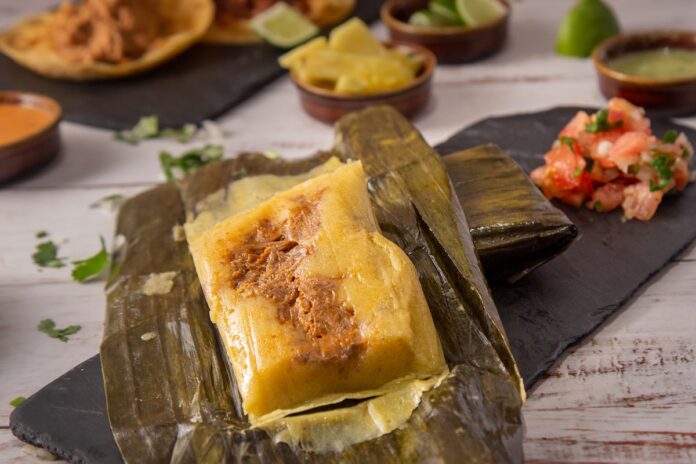She hugged her eight-year-old son Pedro goodbye, giving him his lunchbox.
“No enchilada?”, Pedro asked.
She shook her head. He loved enchiladas, and she wanted to make him some, but, by the end of the day, she was too tired to do any cooking.
“Next week,” she replied, in Spanish. Even though Pedro spoke with her almost exclusively in English, she always talked to him in Spanish. English was a language she could sort of understand, but never felt comfortable with it.
“See you in the afternoon, mama,” Pedro said. “Don’t worry about me.”
Since the past six months, she had been driving him to school. He had stopped using the school bus after he told her that other kids on the bus gave him strange looks.
She blew kisses in his direction, as she opened the trunk of her car. The cooler was there, loaded with tamales. She got inside and rolled up the windows. The heat didn’t work. The mechanic said it was the thermostat valve, but since she couldn’t afford to fix it, she had to dress extra warm and make sure all windows were sealed tight. Winter was especially hard because the windows often leaked, no matter how tightly they were shut. The floormats were musty and damp from the dripping rain and she had to place her shoes next to the heater in her home every morning, to warm them up.
It was a long drive from the school to the grocery store, which was in an affluent neighborhood – luxury SUVs in driveways, mansion-sized homes with immaculately-manicured lawns, pedestrian crosswalks every few blocks, covered bus shelters with clean benches – and was a stark contrast from where she lived: graffiti on street signs, dog poop bags littering the sidewalks, potholes every few blocks, empty trash cans in the middle of the road.
She parked her car four blocks from the store and walked the cooler, a foldable chair and an umbrella, to her regular spot: on the sidewalk, across the street from the entrance to the store.
She pitched the umbrella in its base and sat down. It was pouring buckets, and within minutes, she was wet from the water leaking from the holes in the umbrella.
It was around 9am on a February Friday. The grocery store was mostly empty because of the weather. She presumed that most people were choosing to wait for the weather to calm down before stepping out of their homes. Their homes. Their cars. Their shopping carts loaded with fuzzy organic sodas, fruit tarts, and stress-relieving dandelion extracts. Their lives. Her life. ‘Stop; it’s not getting you anywhere,’ she reminded herself.
A guy came out of the store, his grocery cart full, heading towards his car. “Tamales for sale! I have chicken, vegetarian and gluten-free tamales!”, she motioned, as he walked past her. He smiled and waved at her. ‘Just another day,’ she muttered silently, as she looked up at the gray rain-laden sky.
~
The sky. It was a hot sunny afternoon as she sat on her dad’s shoulders. Every time his arms let go of her legs, she’d start banging them back and forth on his chest. ‘Stop doing that!’, he’d shout. ‘Look at the ocean’. He’d walk into the water and splash some on her face. She’d giggle and clap, salty warm water running over her face.
‘Look over there’, he said, pointing towards the horizon. ‘See that line out there? That’s America. That’s where a better life is. We’ll go there one day.’
That was almost thirty years ago. Years that saw the kidnapping and disappearance of her sister; the passing away of her parents in their hometown in Mexico, leaving her dad’s dreams for his family unfulfilled; a two-week-long migration across the Sonoran Desert into America, costing her one-thousand dollars in fees to smugglers. America. The same country her father had pointed towards on that summer afternoon, as her five-year-old self sat on his shoulders. Somewhere on the horizon was a better, safer life, waiting for her. That’s what she was told.
~
She picked up the rocks from under the umbrella and placed them on top of the cooler. Closing her eyes, she prayed silently: “Dear Lord, please keep my stuff safe. Thank you for your grace.”
She picked up her purse and walked into the store, to use the bathroom. It was starting to get busy. A couple was checking out the alcohol aisle, trying to figure out the best beer for the weekend. She walked past a woman who was reading the ingredients list for organic croutons.
She felt a lump rising in her throat. Maybe it was sadness bubbling up. Or envy. Or a feeling of shame and inferiority. Or a long-held desire to be one of ‘those’ people. Those people who had reliable jobs, safe homes, health insurance, family. Those people who could afford to load their grocery carts and stand in line at the cashier’s, credit card in hand. ‘Maybe one day I might find myself in that line, ready to buy fancy groceries. Or maybe, I might just fit in, somewhere…anywhere,’ she thought, as she walked out.
It had stopped raining. She checked her phone for texts. As was the case almost every day, despite her best attempts not to, she’d end up reading messages from her ex-boyfriend, Pablo. The last message was from almost two years ago. Did it really happen? She found it hard to believe how someone could cheat on their partner for a year and still fake love every day. She was especially worried about the trauma of separation for Pedro, who refused to talk about his father. The last time Pablo had seen Pedro was when he had stormed out of their apartment after she’d asked him if he’d be willing to lend her a thousand dollars for their son. She thought of how sweet he was when they first met at a quinceanera party for a friend’s daughter, offering her a bouquet of flowers and bringing her food from the kitchen. How and when did things change?
“Hello.”
She looked up from her phone. A woman was standing next to her with a twenty-dollar bill.
“Good afternoon, madam. How many tamales you want?”
“Nah…I already had lunch. This is for you. Take care.”
Her hands quivered as she took the bill and bowed, as the woman walked away, smiling.
She ran her fingers over the bill, as if it was unreal. ‘New socks for Pedro, finally’. She gave it a kiss, folded it and tucked it into the bottom of her purse.
~
It was eight-thirty and the long cold day had taken its toll on her. She was slouching on the couch, legs on the coffee table, eating dinner with Pedro as The Sopranos played on the TV.
“How’s the posole?” she asked.
“Yummy.”
“Do you know how to say that in Spanish?”
He nodded, taking a big chunk of the fajitas.
“Then why don’t do it? Didn’t you grow up listening to dad and I talking in Spanish?”
“Mom, first, I don’t want to talk about Dad. And second, I don’t want to talk in Spanish. If the kids at school hear me talking in Spanish to my friend Jose, they poke at us. I just want to stick to English. You’ve got to get better at your English, anyway.”
“But you love Mexican food so much…don’t you?”
“Yeah, but what does that have to do with us talking in Spanish?” Pedro asked as he nibbled at the fajitas.
“It’s all part of our culture…it’s who we are…plus…it makes me feel like I’m at home.”
“Who are we, mama, and where’s home?”
She stopped eating and put her fork and head down. Dinner was scattered across the coffee table: fajitas, posole, chips and salsa. Pedro was licking the salsa with his fingers while playing Minecraft on his phone. Outside their apartment window, was a Burger King billboard: ‘Buy one, Get one free.’
She looked at her hands – Juanita’s hands – hoping to find some trace of her identity, her self. But they claimed no allegiance to either Mexico or America; they were hands, human hands, that were, in this moment, eating a Hispanic dinner in Portland, Oregon, America; hands that wanted to work inside a grocery store – not outside it – but couldn’t, because she didn’t speak English well enough and wasn’t sure if she ever would; hands that wanted to have some connection to her past, thin and dangly as it might be.
Where was she and who was she?
~
The next morning, as she was loading the cooler in her car, Pedro ran towards a maple tree in the parking lot of their apartment building. “Mom, take a photo of me under this tree. It’s so huge!”
He grabbed one of the low-hanging branches as she took a photo.
“What’s this little thing?”, he asked, as he touched a bud with a green leaf starting to make its way out.
She walked over to the tree and brought the bud closer to her face. “It’s a bud that’s about to open.”
“And then what happens?”
“It’ll become a leaf.”
Pedro tweaked the bud with his fingers, smelling it. “Oh, and what’s this? Is it a leaf from this tree?”, he asked as he pointed at a faded brown leaf on the ground.
“Seems like it…maybe it’s from last autumn.”
“Why does the tree grow new leaves if it knows the leaves are going to fall later?”
She put her hands around him and held him tight. “I don’t know…that’s what trees do. But we’re late for school. Let’s go.”
~
She had duct-taped the umbrella holes last night, hoping it’d keep her dry. The forecast called for thirty-mph northeasterly winds, with almost nonstop rain for the entire day.
It was a matter of minutes before the duct tape started to wear off. Her shoes were dripping wet. She squeezed her toes and moved them back and forth to keep them warm.
A couple of women rushed past her, one of them carrying a Chanel purse. “I know, isn’t this crazy? I hate this cold weather!”, she shouted, as they ran into the warm store, their jackets buttoned up and water-resistant gloves snuggling their hands.
A guy walked up from behind her. “What are you selling?”
“Sir, tamales. I have vegetarian and chicken. How many you want?”
“I’ll have three, please” he said, as he handed her a ten-dollar bill.
She opened her purse, trying to find change.
“Don’t worry. Have a good day.”
“Sir, thank you very much,” she replied, as she put the bill at the bottom of her purse, under a kitchen towel that she kept in there to keep the bills dry. Her shoulders relaxed and she stretched her feet out.
Looking inside the dry store, she wished she was selling her tamales in there. Maybe one day she might convince them to buy from her and sell it in their hot foods deli. After all, the store’s logo was ‘We’re your local community-based store’. And, this was the land of opportunity.
She didn’t know why, but she got up from her folded chair, picked up a couple of tamales from the cooler and started dancing, waving the tamales in her hands and singing out loud in the drizzle: “Tamales…tamales for sale! Very good tamales for very good sale!”
People gave her mixed looks. Most of them smiled and went around her. One kid clapped and danced with her for a few minutes, before his mom took him inside the store.
Half an hour later, she was tired and sat down. It was pouring again and she was drenched. ‘Maybe I should’ve stayed home today, dry and resting’, she wished.
‘Home. Where’s home?’ she thought. She remembered her home in Mexico and the first thing that came to mind was that Friday night when she and her sister, Sylvia, were waiting at a bus stop. She had gone inside a convenience store to use the restroom. When she returned Sylvia was gone, swallowed up in the darkness. That was the last she saw her. Now, she wondered where, if at all, she was.
Was it worth going back to that home, that place, whose culture and people she missed, without which she felt incomplete, like an enchilada without sauce? And yet, it was the same place that her dad had wanted them all to get out of, in search of a better life.
Or should she call this place home, this place where she sat under a wet umbrella trying to sell tamales, unsure how much money she’d make; this place where she often felt like a piece stuck in a wrong jigsaw puzzle.
She had a sip of water from her bottle. It was cold. She walked into the store, filling her bottle with warm water in the dining area. She sat down, her hands wrapped around the bottle. The warmth felt sacred and coveted. ‘Them and me. Inside and outside. Dry and wet. Shopping carts full of cakes, and coolers full of tamales that go back home mostly full. Stop. Don’t go down that path,’ she reminded herself.
She took out her phone from her pocket and took a selfie, with the comfy dining area in the background. ‘Maybe someday I’ll work in a place like this,’ she whispered. She looked around for her purse, wanting to put her phone back. ‘Shit! I left it outside!’ She ran out into the rain.
When she got to her spot, there was no umbrella. And her purse, which she had left next to the cooler, was also gone.
“Lord, help me!” she screamed out loud in Spanish.
She ran around in circles near her cooler, not sure what to do. There was a car parked next to her spot. She could see the umbrella under it. She laid down and tried to reach it with her arms.
“Hello?”, asked a woman standing next to her. It was one of those women who were complaining about the rain. She opened the car door.
“Madam, umbrella! Purse!” Juanita pointed towards the car.
“What are you saying?”
“Wind! Under car!”
“I have no idea what you’re talking about. Have a good day,” she said as she and her friend got in their Volvo SUV and drove off.
Juanita picked up the umbrella. The car had driven over it. She opened it, but it wouldn’t stay open: the rivet was broken.
She looked around for her purse, but it was nowhere to be found.
Later that night, she’d try to recall what happened, but it was a confusing medley of feelings and thoughts. All she could remember was dragging the cooler to the trash can outside the store and dumping the tamales, swearing, as they went in. She topped them off with the umbrella. She dragged the empty cooler to her car and threw it upside down in the trunk. She got in the car, her head on the steering wheel and angry confused tears dripping onto the moldy floormat.
‘Horizon! Horizon! Where are you? Are you just a mirage?’, she yelled, banging on the wheel.
~
Pedro was asleep next to her in their full-size bed. She picked up the phone and started to look at photos of Pablo and her. A minute of scrolling past photos of them kissing, holding Pedro in their arms, was more than she could handle. She put the phone away, before picking it up again to check today’s date. Four more days before the rent was due.
She shoved the phone under the pillow, clenching her fists. How many times would she have to keep begging her landlord to allow her to postpone the rent check? How many tamales did she have to sell just to pay the check on time?
She didn’t know when she drifted off to sleep, but there were four words that kept haunting her for the rest of the night: That’s what trees do.
~
She got up at 4.30am, half an hour earlier than usual, and went straight to the kitchen. She opened the fridge and started putting together the ingredients for tamales. And enchiladas.
Kidnapped and disappeared sibling. Green bell peppers and sour cream. Overdue rent checks. Corn dough. Leaking car windows. Tomatoes, salt and pepper. Tamales rotting in wet trash cans. Rice, oil, chicken broth. Broken umbrellas and hearts. Beans, cheese, cilantro, onions. Strangers donating money. Corn tortillas and avocado. Misfits with lost identities. Baking powder, cumin seeds, masa flour. Purse full of a day’s hard earnings, stolen. Chicken, green chiles, radishes. A safe warm home to stay in. Tamales, enchiladas, life.
~
She parked beside the school and handed Pedro his lunchbox. He waved bye and started to walk away.
“Wait. Got a surprise for you,” she said as she handed him a second box. “Open it.”
Pedro didn’t need to open it; he could smell it. “I love enchiladas! Te quiero, mama!”
“Te amo, mi querido,” she said, as she hugged him. ‘I love you, my dear.’
~
As she drove towards the grocery store, she had to keep wiping her hands over her eyes, to brush off the tears. ‘He spoke to me in Spanish,’ she kept repeating.
The store was busy. She setup her chair and the cooler. It was cloudy, but a blue patch was shyly poking out from under the gray sky. She silently recited what Pedro had translated for her last evening when she’d asked him how to say in English ‘Algun dia, voy a trabajar dentro de la tienda, no fuera’. Taking a deep breath and looking straight at the entrance of the store, she said it out loud, in English: “Someday, I’m going to work inside the store, not outside it!”
She took out a couple of tamales from the cooler and stood up, waving her hands. “Tamales for sale! Tamales, tamales!”
About the Author

Kunal Mehra is a multimedia artist who likes photography, filmmaking, writing and hiking. He grew up in India and has been living in Portland, OR, since 2002. His writing has been published by the Press Pause Press, The Mindful Word and Across the Margin magazines, amongst others.
















